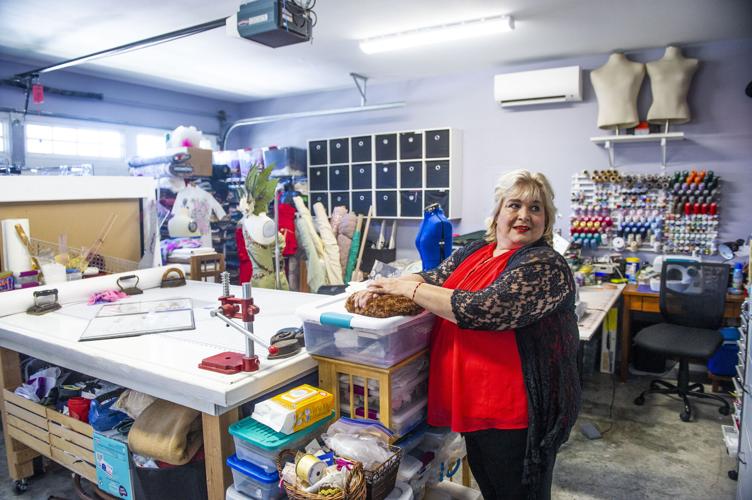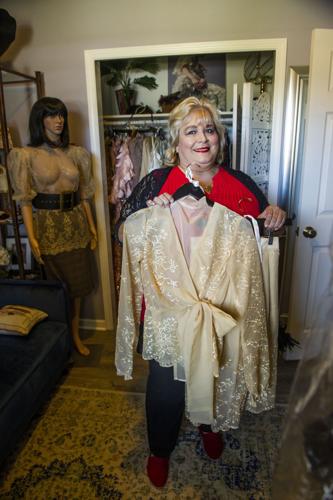“Like visual art forms such as painting and sculpting — fashion design requires technical attention to lines, complementary colors and textures. And similarly, to visual arts, fashion communicates with and captures specific moments in our cultural narrative and converses with designs throughout history.”
— Maria Venturini, couturier
The interminable Seattle-area traffic time-drain may have driven Maria Venturini to Walla Walla, but what truly drew the fashion designer here is the Valley’s natural beauty.
“I came in 2019, so tired of the rat race. I lived on Bainbridge (west across Puget Sound from Seattle) and it was a hassle to get off the island. You could waste a whole day to do one thing,” she said. “I am more a country girl than a city girl even though I like fashion.”
And that’s the bottom line for the Venturini Couture owner-designer, a native of Lima, Peru. Her artistic passion is fashion.
“Nature is my inspiration. The earth, the flowers, the green countryside. Here — it is so wonderful to see all those colors. Here in Walla Walla, it feels like home to me. There are a lot of wineries and I like wine. You can dress nice to have a glass of wine,” she said.
Infused with an innovative spirit, she continued, “Art to me is any form of creative expression. Fashion, simply put, is a creative expression and people use it to express their unique identities daily.”
“Each culture has its respective fashion styles that communicate and reflect its values, beliefs and history. Like visual art forms such as painting and sculpting — fashion design requires technical attention to lines, complementary colors and textures. And similarly, to visual arts, fashion communicates with and captures specific moments in our cultural narrative and converses with designs throughout history.”
Addressing pollution issues
Venturini exercises an artistic eye and flair to create her one-of-a-kind articles of clothing. Reusing, recycling and repurposing secondhand fabrics and clothes is also part of her sensibility to keep from contributing to a burgeoning pollution problem.
She contends that the fashion industry is a major polluter. Sustainyourstyle.org bears that out: The industry “is the second-largest polluter in the world, just after the oil industry. And the environmental damage is increasing as the industry grows.”
The chain of damage is a combination of water pollution and consumption, microfibers in the oceans, waste accumulation, chemical damage, greenhouse gas emissions, soil deflation and desertification and rain forest destruction.
She cited the habit in the 1800s of changing a dress in one’s wardrobe simply by altering the sleeves, skirt or bodice.
“I can do the same thing, alter an existing skirt or make another dress out of the original,” Venturini said.
She scours secondhand stores for draperies and other fabrics. “There’s always a treasure there. My first sale was a pair of pants made from a recycled curtain.”
Designs garner awards
In 2016 she entered the Goodwill Designer Challenge in downtown Seattle’s SoDo District. The skirt she whipped up from two pillowcases and a bed skirt won the contest at the Goodwill gala.
“My designs are always something unique. I don’t like to do for the masses. I concentrate on each person individually, satisfy the client and make them feel beautiful.”
She is currently operating as a sole practitioner.
“A client gets an appointment scheduled, I measure, make the pattern, cut the fabric and sew it up, a lot of it done by hand. I’m a one-woman show.”
She designs by sketching or sometimes, by the feel of the cloth.
“I go and touch a fabric and know what I’m going to do with it. I drape it and make the final goods. To have in your mind or put on a dress form and then see on the person, I can see what looks good and what doesn’t. I look at what’s going to look good on your figure so you look good in the mirror,” she said.
“People can bring a picture of what they want, something long- or short-sleeved. I have a lot of fabric, including from Laila Bridal Studio on Birch Street, which closed in 2019 when the owner, Laurie Haluska, moved to Texas,” Venturini said.
Inspired by family heritage
Venturini’s ancestors come from Spain, France, Italy and Peru. Her former husband is Cherokee, Irish and Scot, making their daughters, Sarah Muir and Catherine “Catie” Muir, “a cocktail.”
Venturini’s grandmothers were seamstresses, she said.
“Even the governor’s wife came to my grandmother for her sewing.”
Her mother sewed for her eight children.
“She learned how to sew and make patterns and made everything for me. We would get clothes from older cousins and she’d redo them for me.
“From a little thing you can make something good. I learned from mom to tailor clothes. Then, when going through my divorce, I turned to sewing.”
Catie Muir urged her mother to go to fashion school. Venturini applied to the Art Institute of Seattle on a Monday in 2015 and by that Friday she was in class. She graduated with honors in 2017, received the school’s Designer of the Year Award that June — “and went straight to sewing.”
She also holds degrees in computer programming, management information systems and international business.
Venturini discovered Walla Walla in the early 2000s when the family came for her daughter’s softball tournaments.
“I looked at the area and wished to move here then, but couldn’t because of my kids not wanting to relocate.”
Once she was single, she decided to start again from zero and bought her home here via Facetime. She meets clients in a pretty room in her home and maintains a creative, ordered work space with sewing, drawing and cutting tables, mannequins, a variety of fabrics and other accoutrements from her garage, including antique irons, to weigh down fabric she’s working on.
She likes light, airy material such as silks and organza.
“I like fabrics that drape, not stretchy, but I try to work with whatever I have,” she said.
She sewed her 2020 line in one week out of silk organza she had on hand.
“The creative director didn’t like it so I changed it in a week.”
There’s a sensuous fluidity to clothing that comes off Venturini’s drawing pad and onto the runway. A video from her 2020 collection, at ubne.ws/2020line, shows satins, silks, laces and feathers that move with the models. Open backs, deep V-plunges or high necklines, sequins; all celebrate the female form.
From simple lines to ornate, patterned and textured fabrics, clothing in the Ready-to-Wear Collection / AW 2021 bears Italian names such as Cioccolato Skirt, Sogno Arrugginito Top, Georneta Selvaggia Blouse, Culture Verdi Crop Pants and Verde Foresta Skirt. Prices range from $120 for the Cafe Con Leche Turtle Neck to $900 for the Amezzanote Inviatta evening gown with train.
Venturini has sewn gowns for beauty pageant contestants such as Miss Planet USA and Mrs. International Washington.
As the business opens up, she is planning to have a grand opening ceremony at her home.
Attending Fashion Week
Her plans were dashed to be at London Fashion Week after COVID-19 hit.
“A fashion school in Milan wanted me to visit but everything went down the drain in 2020.”
She said she won’t go to Fashion District NW in Seattle this year.
“But whenever they open up and invite me, I’ll be there,” she said.
Fashion designers are always looking ahead several seasons, even years. She will be in New York for an indie designer fashion week fall showing of her spring-summer 2022 Recycled Glamour collection. She brings the shoes and clothes and the models, hair and makeup are provided for a fee, she said. She is taking Seattle-based photographer and Peruvian-native Simon Diez and makeup artist Wallace Grow.
Venturini’s 2024 Heritage Collection features Inca-influenced Peruvian designs in warm hues she created in cotton, twill and chiffon. Blouses, suits and other clothing items are part of the line.
Her inspiration comes from high-end ateliers in Paris and Milan, she said. The romantic details and tailoring are evident in her gowns, evening wear and ready-to-wear.
Venturini has raised awareness of her work with advertising features in GQ, British Vogue, House & Garden and other domestic and international magazines.
Through Atelier Venturini, she does alterations and tailoring for customers’ favorite garments, such as hemming, creating zippers for slacks, jeans, skirts and dresses or for cloth, down or leather jackets, all for a fee.
She would like to do a fashion show collaborating with businesses downtown, “and show what’s out there in the fashion world. We could raise money for a charity,” she said. She made a $1,000 dress for Blue Mountain Humane Society’s 2019 fundraising gala.
Venturini’s work starts with a goal in mind.
“What I do is for women to feel and look beautiful,” she said. “You can still look good and pretty. You can be beautiful and wear good things. I like to lift up their spirits.”









(0) comments
Welcome to the discussion.
Posting comments is now limited to subscribers only. Become one today or log in using the link below. For additional information on commenting click here.
Log in
Keep it Clean. Please avoid obscene, vulgar, lewd, racist or sexually-oriented language.
PLEASE TURN OFF YOUR CAPS LOCK.
Don't Threaten. Threats of harming another person will not be tolerated.
Be Truthful. Don't knowingly lie about anyone or anything.
Be Nice. No racism, sexism or any sort of -ism that is degrading to another person.
Be Proactive. Use the 'Report' link on each comment to let us know of abusive posts.
Share with Us. We'd love to hear eyewitness accounts, the history behind an article.